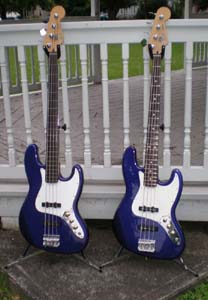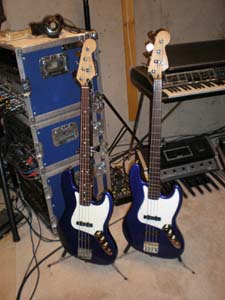Fender Jazz Bass MIM
Last Update 10-18-2009
The story of my guitars is that I stumbled
on them. They would cross my path when I least expect it.
Such was the case with these MIM Jazz Basses. I am not normally a
fan of Fender instruments in that they are way too inconsistent from
one guitar to the next. You'd find one that would sound good but
have poor playability, another would play really good but would sound
like a dog. Trying to find one that both played and sounded good
is HARD, it takes a lot of auditioning sessions in music stores trying
all the guitars on the rack.
Frankly I don't have that kind of patience so I wasn't actively looking
for another bass until I stumbled on this one (there's that word
again). I was in a music store talking to my friends when I
picked up this bass hanging from the ceiling and started playing it
unplugged - and I was immediately struck by this specimen. Played
like butter and the sound (unplugged) was remarkable. I also
noticed that the body and neck had a vibrant resonance when I played
the thing. I was just starting to learn slap-n-pop and my Gibson
RD Artist wasn't cutting it for that style but this MIM Jazz Bass
really barked like a pit bull when I played slap-n-pop.
Resonance goes a long way to good tone on a guitar, which is why the
first thing I do when I audition a guitar is to play it
UNPLUGGED. That way you can judge from the resonance how good the
tone of the guitar will be. This has as much of an impact as well
as strings, pickups, or electronics. The problem is it is either
inherent in the wood or it isn't. Changing pickups, strings,
electronics, bridges, et al does no good if the wood in the guitar have
poor resonance. Yeah you can buy replacement bodies and necks,
but you have to sort through THOSE to find the resonant ones.
There's a lot of dispute over resonance in a solid body guitar but it
is the standard I have used and it hasn't failed me yet.
So after the initial discovery I went home and fetched my bass preamp
and RD bass to compare to this gnarly pit bull. It didn't take
long to pull out the wallet on this one. The store clerk was a
bass player and had expressed disappointment in that he wanted to buy
that bass too. This one was a 2001 model. I gotta stop
going to music stores, all this stumbling is costing me some
money. I was quite surprised that this mexican (Made In Mexico)
sounded and played so good. The store owner told me they
bodies/necks are made in the states and the guitar is assembled in
mexico. I have been picking up MIM basses since I bought one and
I have to admit that there are some good guitars coming out of mexico,
way better than the asian Squire guitars.
It didn't take long before this Jazz Bass eclipsed the RD Artist as my
#1 favorite. The tone on this guitar really sat well in the mix
and was a pleasure to play. My musician peers really liked it
too. For years it remained stock until the cheap bridge started
to rust so I replaced it with a Gotoh bridge of heavier mass for more
sustain and better tone. I also grew tired of the wimpy pickups
that buzzed like a hive of honeybees whenever I came near a flourescent
light or any EMI source like a transformer or CRT. When I put a
set of Dimarzio Ultra Jazz pickups they were a huge improvement - since
they are humbucking pickups they are nowhere near as susceptible to
interference like the old ones. Being humbuckers they also had a
hotter output and fuller punchier tone. Combined with my Ampeg
SVP-Pro preamp, I also noticed that they closely approximated the
bass
sound of Rush (Geddy Lee is one of my favorite bass players).
Since they are split coil, I rewired the control panel with pot having
integrated pull switches so I could put them out of phase or convert
them to single coil. I find the out-of-phase quite effective, the
single coil mode don't make much difference.
Strings make quite a difference in tone. D'Addarios and Ernie
Balls wouldn't last a month, the strings lost their tone. Fender
strings weren't any better. So on a recommendation from the store
clerk I tried DR Lo-Riders. Those strings held their tone for a
LONG time, I didn't replace them for three years. Next string set
were DR Sunbeams and they are the current favorite as they have a
beefier tone without the harsh top end of the Lo-Riders. They
seem like a good string set for the variety of styles I play.
I decided it would be a good idea to find a spare because my studio was
growing and I was getting nervous about risking this bass to theft if I
took it out to clubs. The growing trend is to keep the sonorous
irreplaceable guitars in the studio at home and gig with an
"expendable" guitar. Well, back to the beat in music stores to
find a spare - I tried and tried every new Jazz Bass and none of them
came close to #1. My acid test for playability was Rush's "YYZ"
as it is harder to play on the wrong instrument. You don't
realize how good a guitar you have until you try to find a compareable
spare and it turns into an exercise in futility.
Then one day I found a used '98 Jazz Bass in one of my favorite
stomping grounds for used gear. Played good, sounded good.
This one wasn't planned either but the slight twist was this specimen
was a fretless bass. I
wasn't actively looking for a fretless. I have played a few and
found I have a good ear for it. I also had noticed that my
fingers often land on top of the frets when I play. I also have
good muscle memory when I slide up/down the neck and land on the
note. So I had the technique and ear for a fretless. I
thought it would be nice to add one to my collection but it wasn't a
priority. Then I stumbled (ARGH!) on this fretless and - get this
- same finish as my #1. They are TWINS. Good tone typical of a
fretless. The bridge was badly rusted so a Gotoh went in place of
it. I left the pickups in as they are HOT. As far as I can
tell they are stock and there is no markings on them.
Unfortunately they are vulnerable to interference so I may put a new
set in, but I may try something other than Dimarzio.
Both basses now have metal telecaster-style knobs which I prefer to the
stock stratocaster-style knobs. With the pull switches in the
pots, I can pull on these knobs much easier. I opted for gold
finish knobs as they coordinate very well with the midnight blue
color. I didn't spring for gold plated bridge or tuning machines
because the gold plating tends to wear off with playing so the extra
$$$ wasn't worth it. You don't often mix chrome and gold, but
since the knobs are small profile compared to the other chrome plated
hardware the balance is pleasing to the eye.

Home






